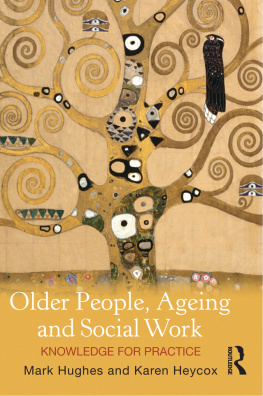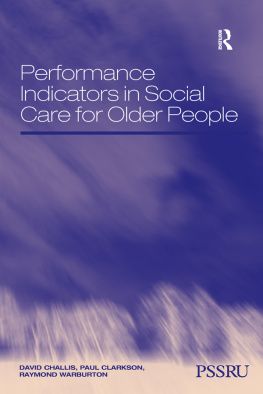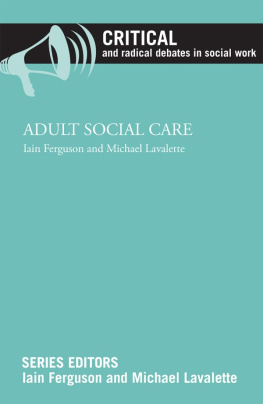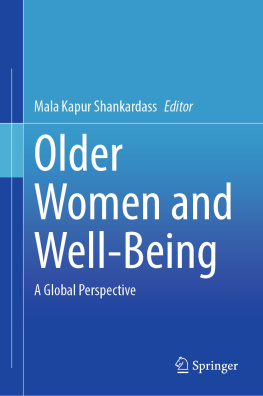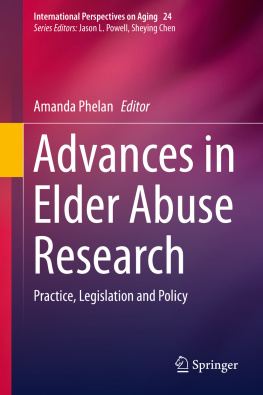SAFEGUARDING OLDER
PEOPLE FROM ABUSE
Critical contexts to policy and
practice
Angie Ash
First published in Great Britain in 2014 by
Policy Press University of Bristol 6th Floor Howard House Queens Avenue Clifton Bristol BS8 1SD UK Tel +44 (0)117 331 5020 Fax +44 (0)117 331 5367 e-mail
North American office: Policy Press c/o The University of Chicago Press 1427 East 60th Street Chicago, IL 60637, USA t: +1 773 702 7700 f: +1 773-702-9756
Policy Press 2014
British Library Cataloguing in Publication Data
A catalogue record for this book is available from the British Library
Library of Congress Cataloging-in-Publication Data
A catalog record for this book has been requested
ISBN 9781447320890 ePUB
ISBN 9781447320920 Kindle
The right of Angie Ash to be identified as author of this work has been asserted by her in accordance with the Copyright, Designs and Patents Act 1988.
All rights reserved: no part of this publication may be reproduced, stored in a retrieval system, or transmitted in any form or by any means, electronic, mechanical, photocopying, recording, or otherwise without the prior permission of Policy Press.
The statements and opinions contained within this publication are solely those of the authors and not of the University of Bristol or Policy Press. The University of Bristol and Policy Press disclaim responsibility for any injury to persons or property resulting from any material published in this publication.
Policy Press works to counter discrimination on grounds of gender, race, disability, age and sexuality.
Cover design by Qube Design Associates, Bristol
Readers Guide
This book has been optimised for PDA.
Tables may have been presented to accommodate this devices limitations.
Image presentation is limited by this devices limitations.
In memory of my mother,
Elizabeth Margery
Contents
Acronyms
2007 ASP(S) Act: Adult Support and Protection (Scotland) Act 2007
A&E: Accident and emergency department (emergency treatment in NHS hospitals in the UK)
DH: Department of Health
DP: Direct payment
GP: General practitioner
HCC: Healthcare Commission
IB: Individual budget
NHS: National Health Service
PB: Personal budget
POVA: Protection of vulnerable adults
SDS: Self-directed support
WHO: World Health Organization
About the author
Angie Ash is director of the UK health and social care research consultancy, Angela Ash Associates (www.ashassociates.co.uk), and is a registered social worker. Angies career has spanned university-based social research, social work practice, charity sector management, research and management consultancy to government, charities and businesses. She is a past winner of the Jo Campling Memorial Prize awarded by the journal Ethics & Social Welfare for her paper on ethics in adult safeguarding. Since completing the research described in this book, Angie has held research fellowships at the University of Bristol and Swansea University alongside her research consultancy.
Acknowledgements
An unpayable debt is owed to the older people whose experiences of care and mistreatment have driven the completion of this book, which was a labour of love.
I am grateful to the many people working in health, social care and adult protection services with whom I have worked, and who have talked with me about their work with older people and in adult safeguarding. My particular thanks and appreciation go to the staff and their managers who took part in the research described in this book.
I acknowledge with gratitude the award of the UKs Economic and Social Research Council post-doctoral fellowship PTA-026-27-2617. The primary research reported in of this book was funded by the UK-based research and development consultancy Angela Ash Associates.
My thanks and appreciation go to Dr Liz Lloyd, University of Bristol, for going out of her way to provide me with material, as well as to: Dr Tova Band-Winterstein of the University of Haifa; Professor Marie Beaulieu, Universit de Sherbrooke; Professor Simon Biggs, University of Melbourne; Professor Derek Birrell, University of Ulster; Dr Claudia Cooper, University College London; Dr Briony Dow, National Ageing Research Institute, Melbourne; Professor Keith Grint, University of Warwick; Professor Jill Manthorpe, Kings College London; and Professor Lynn McDonald, University of Toronto. Also, conversation over dinner in a rain-soaked Oxford summer in 2012 with Dr Herwig Reiter of the German Youth Institute was fortuitous.
Professor Randall Smith of the University of Bristol kindly gave considered and perceptive comments on early drafts of some chapters. All of these were helpful; none is the reason for any shortcomings that may remain. Isobel Bainton, Emily Watt and the staff at Policy Press were always considerate and helpful. The accommodating, resourceful and ever-pleasant staff of Monmouthshire County Council library and information services in Wales never let me down. I am grateful to the anonymous reviewer for feedback.
Finally, warm thanks and gratitude are due to David Mayer for our long comradeship and for digging me out of so many cyber-holes; to Carolyn Sally Jones for a writers solidarity; and for pretty much everything else, to Ruth Cook.
ONE
Contexts to safeguarding older people from abuse
Mrs Rs family were concerned that she would not receive food and drink while in Southampton University Hospitals NHS Trust unless they helped her to eat and drink.
When Mrs H was transferred from Heart of England NHS Foundation Trust to a care home, she arrived bruised, soaked in urine, dishevelled and wearing someone elses clothes.
The care and treatment that Surrey and Borders Partnership NHS Foundation Trust gave Mr L contributed to a loss of his dignity and compromised his ability to survive pneumonia. (Parliamentary and Health Service Ombudsman, 2011, p 3)
These are three of the ten cases reported by the Parliamentary and Health Service Ombudsman for England on 14 February 2011. Nine of the ten people discussed in the Ombudsmans report titled Care and Compassion? died during, or shortly after, the events considered occurred. The Ombudsman observed that the circumstances of their deaths have added to the distress of their families and friends, many of whom continue to live with anger and regret (Parliamentary and Health Service Ombudsman, 2011, p 8).
This book is about safeguarding older people from abuse. Notwithstanding reference to the Parliamentary and Health Service Ombudsman cases referred to above, it is not intended as a handwringing, head-shaking where did we go wrong account of care and support to older people, nor as a hatchet job on social care or publicly funded, free-at-the-point-of-delivery, healthcare or on those who deliver it to citizens irrespective of their means. Older people may be abused and mistreated in community-based, domestic settings by people they know and would otherwise trust, for example, paid carers, family members, friends and neighbours.
A core intention of the book is to identify and critically appraise the influence of contextual factors on decision-making by those involved in adult safeguarding, including social workers, and their NHS (National Health Service) and police partners. The books purpose is three-fold. First, it sets out to understand, at a deeper, theoretical level than the transient reporting of scandals of mistreatment, with their attendant action plans and the familiar learning of lessons suggests, why otherwise decent, initially well-motivated, highly trained professionals, such as nurses, social workers and doctors, and other practitioners or paid carers, can appear blind to poor and abusive care of older people or, worse, why they may apparently perpetrate egregiously bad care.


